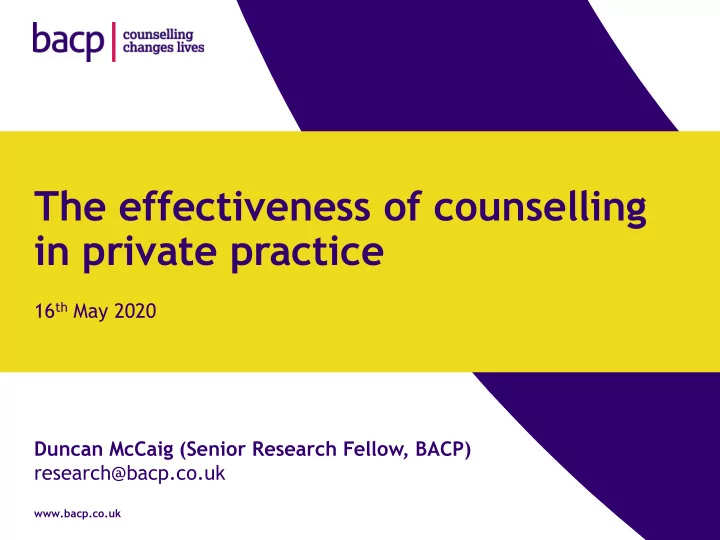

The effectiveness of counselling in private practice 16 th May 2020 Duncan McCaig (Senior Research Fellow, BACP) research@bacp.co.uk www.bacp.co.uk
Overview of presentation • Background • Project aim and method • Results • Conclusions and implications 2
Background Research can… … enhance “our professional knowledge and [provide] an evidence-base for practice in ways that benefit our clients ” 3
Effectiveness of counselling Evidence traditionally comes from… • Randomised controlled trials • Analyses of several studies More evidence needed from… • Qualitative research • Routine practice-based datasets 4
Routine outcome measures CORE-10 • Self-report measures completed by clients (psychological distress) Over the last week I have felt tense, anxious or nervous. (not at all) 0 1 2 3 4 (most or all of the time) • Add or average scores for all questions = 2 Session 1 = 3.2 Session 2 = 1.8 Session 3 5
Benefits of routine outcome measurement Therapists • Tracking therapeutic progress • Spot patterns otherwise missed patterns Individual clients • Client outcomes potentially improved with outcome measures 6
Issues with routine outcome measurement Therapists • Time-consuming • Do not capture therapeutic process Individual clients • Question motives for using measures • Confidentiality issues 7
Benefits of routine outcome measurement Counselling as a profession • Pooling routine outcome data enables more robust statistical analyses More routine outcome data Better evidence for counselling! 8
Aim of project Challenge: Difficult to collect routine outcome data from private practice Aim: Pilot an online system with private practitioners to: 1. Support use and interpretation of routine outcome measures 2. Build an evidence base for counselling in private practice 9
Method • Project is ongoing Eligibility criteria • BACP member • Working in private practice Training • Participating therapists trained in outcome measures and online system Data collection • Participating therapists complete quarterly survey • Outcome data pooled if both therapist and client consent 10
• Online system • Can review a client’s • Clients complete outcome measures progress or attendance before , during or after a session • Can review all clients • Scores recorded and plotted 11
Results 12
Use of routine outcome measures • To date, routine outcome data collected and pooled from… 41 therapists 451 clients 3739 sessions 13
Acceptability of outcome measures 87% of practitioners reported that the outcome measures fit well with their therapeutic style 60% of practitioners asked clients to complete outcome measures every session Most (93%) clients agreed to complete outcome measures, and most (67%) agreed to share their data for research purposes 14
Benefits of outcome measures Guide therapy “useful launching off point for some sessions.” Increase understanding “[developed] a better sense of understanding and deeper awareness for myself and my clients.” 15
Issues with outcome measures Not for all clients “Elderly clients don’t like digital [system] even when face to face.” Non completion “Clients say they’ll do it but they don’t.” 16
Effectiveness of counselling 118 clients CORE-10 (psychological distress) 25 Moderately severe 20 Moderate 15 Score Mild 10 Low level 5 Healthy 0 1 2 3 4 5 6 Session number 17
Effectiveness of counselling 8 clients GAD-7 PHQ-9 (anxiety) (depression) 20 20 Moderately severe 15 15 Moderate Moderate Score Score 10 10 Mild 5 5 0 0 1 2 3 4 5 6 1 2 3 4 5 6 Session Session 18
Conclusions and implications 19
Acceptability Private practitioners • Use routine outcome measures and online system • Viewed as valuable clinical tool “enables the client to come up with theories for their scores” Clients • Most complete outcome measures and contribute data for research 20
Effectiveness of counselling Over six sessions… • Steady reduction in severity of psychological distress • Reduced levels of anxious and depressive symptoms However… • We, as a profession, need more data! 21
Tips for better routine outcome measurement • Use the same measure(s) each time • Complete every session • Keep accurate records of scores 22
Take-home messages Most therapists… • Found routine outcome measures fit their therapeutic style • Used routine outcome measures every session Most clients… • Agreed to complete routine outcome measures • Contributed their data for research More routine outcome data Better evidence for counselling! 23
Thank you Contact details BACP Research Team research@bacp.co.uk 24
Recommend
More recommend